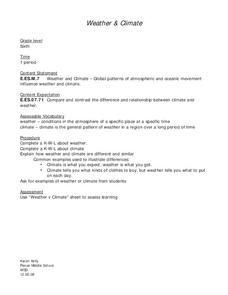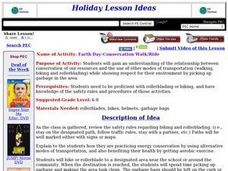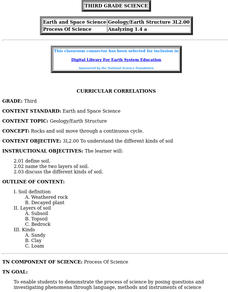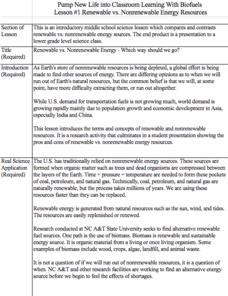Curated OER
Weather & Climate
Sixth graders differentiate weather and climate. For this earth science lesson, 6th graders complete a KWL chart about the two. They complete a worksheet by identifying whether a certain statement describes weather or climate.
Curated OER
Moon Phase Stations
Third graders investigate the moon. For this Earth science lesson, 3rd graders discuss the moon phases and how every 4 weeks the moon cycles through these phases.
Curated OER
Let's Create an Ecosystem
Seventh graders discover how an ecosystem works by creating one in class. In this Earth science lesson, 7th graders study vocabulary terms associated with ecosystem and read environment handouts. Students create an...
Curated OER
Primary Level: Earth Day
Students research the environment prior to brainstorming a list of ways they can help stop Global Warming. Students then design posters to hang throughout the school and choose at least 1 action to implement in their household.
Curated OER
Earth Day-Conservation Walk/Ride
Students explore the relationship between conservation of our resources and the use of other modes of transportation (walking, biking and roller blading). They show respect for their environment by picking up garbage in the area. They...
Curated OER
Me and My Shadow
Students apply the process of scientific inquiries or technological design to explore the explanations of the daily patterns of the Earth's rotation. They record different shadow lengths showing the apparent movement of the sun through...
Curated OER
Glaciers
Seventh graders summarize how Earth processes today are similar to
those that occurred in the past. They read excerpts from John Muir's "Yosemite Glaciers" and explain how slow geologic processes have large cumulative effects over long...
Curated OER
Is There Water on Mars?
Students decide whether or not there is or has even been water on Mars. They analyze temperature and pressure data from the Pathfinder mission to Mars, and then they analyze images of Mars, interpreting the landforms they see and...
Curated OER
The Phantom of the Computer Lab
Students calculate the power consumption of computers in school. In this physics lesson, students design an experiment to determine whether the school should unplug computers at the end of the day. They collect data and report findings...
Curated OER
Water Works Wonders
Students examine where water is found in the world, how we use it, and the various forms it takes. They observe the refraction of light through a prism, record the day and night sky over a week's time, and create a topographic model of...
Curated OER
Medicine: Then and Now
Students read ancient Greek texts to explore ancient healing practices and compare them to modern-day medicine. They conduct research into modern first-aid practices, using a standard medical reference.
Curated OER
Mini-Ponds
In this mini pond worksheet, students create a mini-pond ecosystem with soil, water, and plant life. Students let their ecosystem sit for a day and they observe a sample the next day. Students identify all the pond water microorganisms...
Curated OER
The Moon
Students design and build an ideal lunar settlement. In this astronomy lesson plan, students identify the key features of the moon. They compare its environmental condition with the Earth's.
Curated OER
Wax On, Wane Off
Students explore the Earth's only natural sattelite, the moon. They view a demonstration using tennis balls of the waxing crescent moon, waxing gibbous moon and a lunar eclipse.
Curated OER
The ABCs of Conservation
Students identify the letters of the alphabet and corresponding sounds and words that begin with that letter.
Curated OER
Learning from Light: The Big Bang
High schoolers explore what astronomers are able to examine our galaxy and universe by examining light. They explore in this sub-unit the formation of the universe, commonly called "The Big Bang," and it follows studying from the Light:...
Curated OER
Curricular Correlations
An interesting lesson on different types of soils is here for you. In it, learners discuss what soil is, and consider three piles of soil - clay, sand, and loam. During the rest of the lesson, third graders discover all sorts of...
Curated OER
Ecosystems Lesson Plan
Students research ecosystems (rainforest, desert, grassland, woodland, and arctic tundra). Students compare the seven continents and the importance of proximaty to the equator.
Laboratory for Atmospheric and Space Physics
Planetary Distances on the Playground
There's no need to stay inside; get out of the classroom and create a scaled map of the solar system on your playground field! In collaborative groups, scholars identify the distance between the sun and other planets, place planet...
Kenan Fellows
Renewable vs. Nonrenewable Energy Resources
Is one type of energy inherently good or bad? Young scientists explore energy resources in a week-long unit. After extensive research, groups create powerful position statements and presentations supporting their energy resource of choice.
Chicago Botanic Garden
Recent Weather Patterns
Decide whether weather is changing! A two-part activity first challenges classes to review the differences between weather and climate. Once finished, individuals then analyze historical data to determine if climate change is happening...
Laboratory for Atmospheric and Space Physics
Charting the Progress of New Horizons
In 2006, New Horizons began its mission to fly to Pluto. As it continues its journey, scholars track its progress with the help of an informative website, all the while reinforcing measurement concepts with the construction of a scaled...
Curated OER
Moon Mining
Go on a moon mining expedition from the safety of your classroom with this space exploration simulation. Using simple models of the moon's surface prepared ahead of time by the teacher, young scientists are challenged with locating and...
Science Matters
Renewable and Nonrenewable Resources
Did you know there are at least 12 different energy sources? Scholars apply their knowledge about the different types of energy as they sort energy sources by renewable and nonrenewable. Then they pick one from each section to...
Other popular searches
- Science Earth Day Activities
- Science Earth Day Lessons
- Earth Day Science
- Earth Day Science Projects
- Earth Day Science Lesson Plans

























